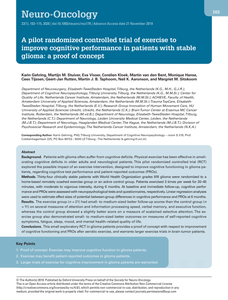INTRODUCTION: After treatment with chemotherapy, many patients with breast cancer experience cognitive problems. While limited interventions are available to improve cognitive functioning, physical exercise showed positive effects in healthy older adults and people with mild cognitive impairment. The Physical Activity and Memory study aims to investigate the effect of physical exercise on cognitive functioning and brain measures in chemotherapy-exposed patients with breast cancer with cognitive problems.METHODS AND ANALYTICS: One hundred and eighty patients with breast cancer with cognitive problems 2-4 years after diagnosis are randomised (1:1) into an exercise intervention or a control group. The 6-month exercise intervention consists of twice a week 1-hour aerobic and strength exercises supervised by a physiotherapist and twice a week 1-hour Nordic or power walking. The control group is asked to maintain their habitual activity pattern during 6 months. The primary outcome (verbal learning) is measured at baseline and 6 months. Further measurements include online neuropsychological tests, self-reported cognitive complaints, a 3-tesla brain MRI, patient-reported outcomes (quality of life, fatigue, depression, anxiety, work performance), blood sampling and physical fitness. The MRI scans and blood sampling will be used to gain insight into underlying mechanisms. At 18 months online neuropsychological tests, self-reported cognitive complaints and patient-reported outcomes will be repeated.ETHICS AND DISSEMINATION: Study results may impact usual care if physical exercise improves cognitive functioning for breast cancer survivors.TRIAL REGISTRATION NUMBER: NTR6104.
DOCUMENT

Study goal: This study was carried out to answer the following research question: which motivation do healthy volunteers have to participate in phase I clinical trials? - Methods: A literature search was done through Google Scholar and Academic Search Premier, followed by three interviews with volunteers who had recently concluded their participation in a (non-commercial) phase I trial. - Results: Our literature search revealed mainly commercial motives for volunteers to participate in phase I clinical trials. The interviews (with volunteers in a non-commercial trial) showed that other factors may also play a decisive role, such as: (1) wish to support the investigator (2) wish to contribute to science, (3) access to more/better health care (4) sociability: possibility to relax and to communicate with other participants (5) general curiosity. Precondition is that risks and burden are deemed acceptable. - Conclusions: financial remuneration appears to be the predominant motive to participate voluntarily in a clinical trial. Other reasons were also mentioned however, such as general curiosity, the drive to contribute to science and the willingness to help the investigator. In addition, social reasons were given such as possibility to relax and to meet other people. Potential subjects state that they adequately assess the (safety) risks of participating in a trial as part of their decision process.
DOCUMENT

Abstract Background: Patients with glioma often suffer from cognitive deficits. Physical exercise has been effective in ameliorating cognitive deficits in older adults and neurological patients. This pilot randomized controlled trial (RCT) explored the possible impact of an exercise intervention, designed to improve cognitive functioning in glioma patients, regarding cognitive test performance and patient-reported outcomes (PROs). Methods: Thirty-four clinically stable patients with World Health Organization grades II/III glioma were randomized to a home-based remotely coached exercise group or an active control group. Patients exercised 3 times per week for 20-45 minutes, with moderate to vigorous intensity, during 6 months. At baseline and immediate follow-up, cognitive performance and PROs were assessed with neuropsychological tests and questionnaires, respectively. Linear regression analyses were used to estimate effect sizes of potential between-group differences in cognitive performance and PROs at 6 months. Results: The exercise group (n = 21) had small- to medium-sized better follow-up scores than the control group (n = 11) on several measures of attention and information processing speed, verbal memory, and executive function, whereas the control group showed a slightly better score on a measure of sustained selective attention. The exercise group also demonstrated small- to medium-sized better outcomes on measures of self-reported cognitive symptoms, fatigue, sleep, mood, and mental health-related quality of life. Conclusions: This small exploratory RCT in glioma patients provides a proof of concept with respect to improvement of cognitive functioning and PROs after aerobic exercise, and warrants larger exercise trials in brain tumor patients.
DOCUMENT
